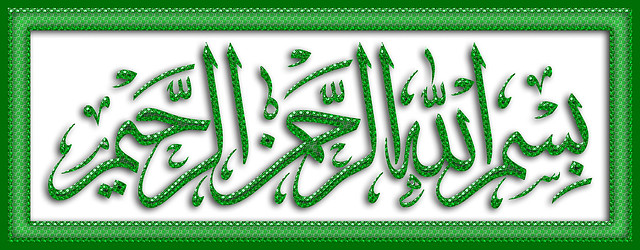Rulings Of Sacrifice - UDHIYAH -1st
Allah says, in Quran
This day, I have perfected your religion for you,
completed My Favour upon you,
and have chosen for you Islâm as your religion.
(Al-Maeda-3)
Bismillah Walhamdulillah Was Salaatu Was Salaam 'ala Rasulillah
As-Salaam Alaikum Wa-Rahmatullahi Wa-Barakatuhu
{In the name of Allah, praise be to Allah, and may His peace and blessings be upon His messenger
{ Peace be upon you, and the mercy of Allaah and His blessings}

book by Muhammad Salih Al-Munajjid
Udhiyah
is one of the great rituals of Islam, in which we remember the Unity of
Allaah, His blessings upon us and the obedience of our father Ibraaheem
to his Lord, and in this act of udhiyah there is much goodness and
blessing. So the Muslim must pay attention to its great importance. The
following is a brief look at this important ritual. Udhiyah
refers to the animal (camel, cattle or sheep) that is
sacrificed as an act of worship to Allaah, in the country in which the
person offering the sacrifice lives, during the period from after the
Eid prayer on the Day of Nahr (Eid al-Adhaa) until the last of the Days of Tashreeq (the 13th day of Dhu'l-Hijjah), with the intention of offering sacrifice. Allaah says (interpretation of the meaning):
"Therefore turn in prayer to your Lord anf sacrifice (to Him only)."
[al-Kawthar 108:2]
"Therefore turn in prayer to your Lord anf sacrifice (to Him only)."
[al-Kawthar 108:2]
"Say (O Muhammad): `Verily, my prayer, my sacrifice, my living and my
dying are for Allaah, the Lord of the `Aalameen (mankind, jinns and
all that exists)."
dying are for Allaah, the Lord of the `Aalameen (mankind, jinns and
all that exists)."
[al-Anaam 6:162]
"And for every nation We have appointed religious ceremonies, that
they may mention the Name of Allaah over the beast of cattle that He
has given them for food. And your God is One God, so you must submit
to Him Alone (in Islam)"
they may mention the Name of Allaah over the beast of cattle that He
has given them for food. And your God is One God, so you must submit
to Him Alone (in Islam)"
[al-Hajj 22:34]Udhiyyah
is a confirmed Sunnah according to the majority of scholars (some
scholars say that it is waajib or obligatory; this will be discussed in
more detail below).
The
basic principle is that it is required at the appointed time from one
who is alive on behalf of himself and the members of his household, and
he may include in the reward for it whoever he wishes, living or dead.
With
regard to udhiyah on behalf of one who is dead, if the deceased
bequeathed up to one third of his wealth for that purpose, or included
it in his waqf (endowment), then these wishes must be carried out,
otherwise, if a person wishes to offer a sacrifice on behalf of someone
who has died, this is a good deed and is considered to be giving charity
on behalf of the dead. But the Sunnah is for a man to include the
members of his household, living and deed, in his udhiyah, and when he
slaughters it, he should say,
"Allaahumma haadha anni wa an aali bayti (O Allaah, this is on behalf of myself and the members of my household"
He does not have to make a separate sacrifice on behalf of every deceased person.
"Allaahumma haadha anni wa an aali bayti (O Allaah, this is on behalf of myself and the members of my household"
He does not have to make a separate sacrifice on behalf of every deceased person.
The
scholars agreed that sacrificing the animal and giving its meat in
charity is better than giving its value in charity, because the
Messenger (peace and blessings of Allaah be upon him) used to make the
sacrifice, and he did not do anything but that which is best and most
befitting.This is the opinion of Abu Haneefah, al-Shaafai and Ahmad.
Ya Allah !
Surely We Have Heard A Preacher Calling To The Faith,
Saying : Believe in Your Allah, So We Did Believe;
Ya Allah !
Forgive Us Therefore Our Faults,
And Cover Our Evil Deeds And Make Us Die With The Righteous.
Ya Allah !
Grant Us Good in This World And Good in The Hereafter,
And Save Us From The Chastisement Of The Fire.
Ya Allah !
Accept From Us ;
Surely Thou Art The Hearing, The Knowing
Surely We Have Heard A Preacher Calling To The Faith,
Saying : Believe in Your Allah, So We Did Believe;
Ya Allah !
Forgive Us Therefore Our Faults,
And Cover Our Evil Deeds And Make Us Die With The Righteous.
Ya Allah !
Grant Us Good in This World And Good in The Hereafter,
And Save Us From The Chastisement Of The Fire.
Ya Allah !
Accept From Us ;
Surely Thou Art The Hearing, The Knowing
Please Take A Moment To Forgive Me For All Mistakes
And Make Dua For Me If You Have Received Anything Of Benefit
Share This Post With Ur Family & Friends
Guiding One Soul To Knowledge And Faith Is A Momentous Achievement
It Is What Will Earn Us Great Blessings Insha Allah
May Allah Accept This Little Service From Us
Ameen Ya Rabbul Alameen !!!!!!
Rasool Allah Sallalahu Alaihe
Wassalam Na Farmaya :
"Allah Ki Qasam Agar Tere Zariye
Ek Aadmi Ko Hidayat Mil Jaye Toh
Woh Tere Liye Surq Ountoun Se Behtar Hai
Wassalam Na Farmaya :
"Allah Ki Qasam Agar Tere Zariye
Ek Aadmi Ko Hidayat Mil Jaye Toh
Woh Tere Liye Surq Ountoun Se Behtar Hai
Abu Dawood-JILD3 PAGE 322....
--~---
--~---
سُبْحَانَكَ اَللَّهُمَّ وَبِحَمْدِكَ أَشْهَدُ أَنْ لَّاإِلهَ إِلَّا أَنْتَ أَسْتَغْفِرُكَ وَ أَتُوبُ إِلَيْكَ
تو
پاک ہے اے اللہ اور میں تیری حمد کرتا ہوں، میں گواہی دیتا ہوں کہ تیرے
سوا کوئی معبود نہیں میں تجھ سے بخشش چاہتا اور تیری طرف توبہ کرتا ہوں۔
---~---
اَللّٰهُمَّ
إِنِّیْ أَعُوْذُ بِكَ مِنْ عَذَابِ الْقَبْرِ، وَأَعُوْذُ بِكَ مِنْ
عَذَابِ جَھَنَّمَ، وَأَعُوْذُ بِكَ مِنْ فِتْنَةِ الْمَسِيْحِ
الدَّجَّالِ، وَأَعُوْذُ بِكَ مِنْ فِتْنَةِ المَحْيَا وَفِتْنَةِ
الْمَمَاتِ، اَللّٰهُمَّ إِنِّیْ أَعُوْذُبِكَ مِنَ الْمَأْثَمِ
وَالْمَغْرَمِ
اے
اللہ ، میں عذاب قبر سے تیری پناہ چاہتا ہوں اور میں جہنم کے عذاب سے تیری
پناہ چاہتا ہوں اور میں دجال مسیح کے فتنے سے تیری پناہ چاہتا ہوں۔اور میں
زندگی اور موت کی آزمائشوں سے تیری پنا ہ چاہتا ہوں۔اے اللہ ، میں گناہ
اور قرض سے تیری پنا ہ چاہتا ہوں۔
======================
Remember Me In UR Prays
Mrs Rubina Yasmeen
=======================
Jazak Allah Khair




























